Welcome to Sign on the Window, the podcast where we randomly select a Dylan song (or in today's case, album), listen to it, reckon with it, live with it and then talk about it. We look to build context but also allow the songs to live in present day. This week, it's 1967's John Wesley Harding.
Daniel and Kelly present Moral Learning Corner, swoon over the harmonica and bass, and let a 50 year old album into their lives.
EPISODE
SHOW NOTES
John Wesley Harding was recorded in 3 days, 4 sessions, in the fall of 1967 over the course of less than 9 hours. It was released on December 27, 1967. The album, despite Dylan asking Columbia not to do any press or promotion, debuted at #2 in the US (behind the Monkees *Pisces, Aquarius, Capricorn & Jones Ltd.. The album is known for its sparse arrangement. Dylan on guitar, harmonica, and piano; Kenneth Buttrey on drums; and Charlie McCoy on bass.
As discussed before, this album is unique as all the songs (sans “Down Along the Cove” and “I’ll Be Your Baby Tonight”) were written without music in mind. Dylan, in 1968, on the lyrics:
What I’m trying to do now is not use too many words. There’s no line that you can stick your finger through, there’s no hole in any of the stanzas. There’s no blank filler. Each line has something.
Dylan in 1971 on the sound:
[I] didn’t intentionally come out with some kind of mellow sound… I would have liked… more steel guitar, more piano. More music… I didn’t sit down and plan that sound.
Even the band noticed a change, Charlie McCoy noted later:
Kenny [Buttrey] and I were amazed at the change from Blonde on Blonde to John Wesley Harding. The recording was different. Of course, he sounded different. He looked different… when he first came for Blonde on Blonde, it was the wild fright wig. The next time he came back his hair was a lot shorter. His voice sounded different… we just flew through that stuff.
The cover photograph of John Wesley Harding shows Dylan flanked by two Bengali Bauls, brothers, Luxman and Purna Das, brought to Woodstock by Albert Grossman. Behind Dylan is Charlie Joy, a local stonemason and carpenter. There was rumors of The Beatles being the trees behind the men. Below, you can find the liner notes to read about Frankie and the gang. (And follow us on Twitter if you haven’t already!)
Kelly felt like a turncoat, and that last week’s TBLS Vol. 5: Rolling Thunder Revue messed her up. She felt like she long for acoustic Bob but couldn’t get Scarlet out of her head. For her, it “sounds very 60’s. I can easily see someone canoodling in a field with painted faces” swaying to JWH, though Daniel found that too much. They talked about how our views of hippies have evolved and if they’d have listened to this back then with some kind of rigor we imagine today.
Daniel and Kelly dove into the songs and tried to find the morals, if there were any.
"John Wesley Harding" (13:15)
Kelly looked up the historical John Wesley Hardin and it has nothing to do with this. Daniel posits that this is on purpose, that this album is as surreal as Blonde on Blonde. It takes place in another universe. Dylan told Rolling Stone in 1969:
I was gonna write a ballad on… like maybe one of those old cowboy… you know, a real long ballad. But in the middle of the second verse, I got tired. I had a tune, and I didn’t want to waste the tune, it was a nice little melody, so I just wrote a quick third verse, and I recorded that… I knew people were gonna listen to that song and say that they didn’t understand what was going on, but they would’ve singled that song out later, if we hadn’t called the album John Wesley Harding and placed so much importance on that, for people to start wondering about it… if that hadn’t been done, that song would’ve come up and people would have said it was a throw-away song.
The moral of the story: for Kelly: if you’re nice to people and have all the guns, people will like you; for Daniel: don’t be a John Wesley Hardin, be a Harding!
“As I Went Out One Morning” (17:15)
Harmonica and bass. The bass is incredible and drives the entire track. Kelly wasn’t seeing the song clearly, so they go into Tom Paine. Tom Paine as symbol, as metaphor for America consistently turning its back on the underprivileged – in this case, a woman in chains, a slave. As Griel Marcus wrote:
I sometimes hear the song as a brief journey into American history; the singer out for a walk in the park, finding himself next to a statue of Tom Paine, and stumbling across an allegory: Tom Paine, symbol of freedom and revolt, co-opted into the role of Patriot by textbooks and statue committees, and now playing, as befits his role as Patriot, enforcer to a girl who runs for freedom—in chains, to the South, the source of vitality in America, in America’s music—away from Tom Paine. We have turned our history on its head; we have perverted our own myths…
The moral of the story: for Kelly: “You should always listen to strangers if you want to go on adventures, but now it doesn’t seem like it was like that at all;” for Daniel, don’t be the Tom Paine of the song.
"I Dreamed I Saw St. Augustine" (Ep. 25) (23:12)
Covered only two weeks before, Kelly felt a new level of haunting when it came to the song. Please see that episode for more.
The moral of the story: don’t act rashly, especially if the judgment you’ll render is one that making the wrong call will give you much grief.
“All Along the Watchtower” (24:05)
Impossible for them to talk about without mentioning Battlestar Galactica. The thrust of the TV show is the same as the song itself -a circuitousness moment, one that has come before and will come again. Finding a moral was tough. Finding one take for the song is impossible. On the show, Daniel quotes Andy Gill:
In Dylan’s version of the song, it’s the barrenness of the scenario which grips, the high haunting harmonica and simple forward motion of the riff carrying understated implications of cataclysm; as subsequently recorded by Jimi Hendrix, … that cataclysm is rendered scarily palpable through the dervish whirls of guitar.
contrasting it with Dave Van Ronk, whom we talked about in our first Supplemental Series, saying
That whole artistic mystique is one of the great traps of this business, because down that road lies unintelligibility. Dylan has a lot to answer for there, because after a while he discovered that he could get away with anything—he was Bob Dylan and people would take whatever he wrote on faith. So he could do something like ‘All Along the Watchtower,’ which is simply a mistake from the title on down: a watchtower is not a road or a wall, and you can’t go along it.
“The Ballad of Frankie Lee and Judas Priest” (30:15)
This was the first song of the John Wesley Harding sessions and proved to set (and break) the template for what was to come. Daniel loves the song because hidden beneath the monotone is a dark town with mysterious murderhouses and creepy children saying the phrase, “Nothing is revealed.” Saying JWH is a collection of stories is anchored in this track. For Kelly, Frankie Lee is a bum and if you stay $10 on a stool, you can open a heaven dimension.
The moral of the story: for Kelly: “One should be where one does not belong. You should others. And don’t mistake paradise for roadside houses;” for Daniel, restoring Dylan’s poetry and letting the song speak for itself:
Well, the moral of the story The moral of this song, Is simply that one should never be Where one does not belong. So when you see your neighbor carryin’ somethin’ Help him with his load And don’t go mistaking Paradise For that home across the road
“The Drifter’s Escape” (34:37)
Daniel told Kelly this is a classic tale of protagonist on trial for he knows not what and the judge casting his robe aside and through teary eyes telling him he can’t save him while the jury — the jerks — find him guilty but he’s saved his fate just then by a lightning strike — sent by God, or perhaps the Devil — as the stupid town falls to its knees unquestioningly. A tale as old as time! This song was written after “Frankie Lee and Judas Priest” and Heylin notes:
Dylan had found a way to tell a five-act story in just three verses. Enthused by what he had achieved, he began writing a whole set of songs along similar lines.
The moral of the story: for Kelly, “crying juries are useless;” for Daniel, don’t be in a jury in a society that judges people without reason.
"Dear Landlord" (Ep. 24) (36:15)
Kelly and Daniel already covered this in Episode 24. There was no harmonica, which really threw Kelly off.
Daniel reiterates the moral: listen to the pleas of those around you, respect the level of authority you may have but don’t forget that you’re not above being asked for something.
“I Am a Lonesome Hobo” (37:30)
They debate is the man has lost all of this money or if he’s spiritually bankrupt. Daniel notes the syncopated drums and Dylan’s vocals.
The moral of the story: for Kelly, spending money on gold teeth and clothes is the fast track to homelessness, or, more succinctly, a fool and his gold are soon parted; for Daniel, it’s in the song
But let me just warn you allBefore I do pass onStay free from petty jealousiesLive by no man’s codeAnd hold your judgment for yourselfLest you wind up on this road
“I Pity the Poor Immigrant” (40:50)
Perhaps the toughest song to try to crack. Like “Dear Landlord,” it was perhaps a great opening line that Dylan felt the need to try to finish. (And it is that drive, to document this short period of time onto an album, that is truly admirable.) Daniel attempts it (with the help of Tony Attwood) and not conflating “immigrant” with “refugee.” He writes,
On one level Dylan pities people who do bad things because then inevitably their world falls apart. But the opening lines also pity those who forever believe the grass is always greener, and on finding that it isn’t feels betrayed and so retaliates against his new homeland that has let him down… In short, Dylan is focused on people who think that the answer to all the problems is simple. ‘If only I moved to another country,’ ‘If only she loved me,’ ‘If only we had a child,’ ‘If only I had a bit more money…’
In the end, the moral is still in the title. It’s still something we haven’t learned.
“The Wicked Messenger” (44:40)
A fascinating song as one can make the argument that a period of Bob Dylan’s songwriting (perhaps his greatest) came to an end with this song. The bass and Dylan’s voice tip-toe around one another to perfection. This is a robust song that deserves an entire episode where one can delve into the mystery but also talk about the “amnesia” that was at hand.
The moral of the story:
And he was told but these few words Which opened up his heart If ye cannot bring good news, then don’t bring any
“Down Along the Cove” and “I’ll Be Your Baby Tonight” (47:45)
These are the only two songs that were written to music and were part of the final session (cut in one take with “The Wicked Messenger” and “Dear Landlord”). These two feature steel guitar (from Pete Drake, who’d just finished playing with Chet Atkins, discussed in our second installment of The Supplemental Series) and were composed with music in mind. No moralizing here, and is more of prelude of what’s to come on Nashville Skyline than what he’d just achieved with JWH.
After John Wesley Harding came out, Dylan quieted down. He went back to Big Pink and played with The Band before taking a prolonged break between his next studio album and his next live performance. Dylan said about this time,
One day I was half-stepping, and the lights went out,” Dylan would recall ten years later. “And since that point, I more or less had amnesia… It took me a long time to get to do consciously what I used to be able to do unconsciously.
From folk masterpieces, to redefining rock music, to the Basement Tapes, Dylan would release Nashville Skyline in 1969 but, this first run of the song and dance man, Bob Dylan, has ended.
He would perform once in the months between John Wesley Harding. Woody Guthrie passed away on October 3, 1967. Dylan reached out if there would be a memorial show and on January 20, 1968, at Carnegie Hall, with The Band (billed as The Crackers!), they played “Grand Coulee Dam”, “Dear Mrs. Roosevelt”, and “I Ain’t Got No Home.” As if Guthrie’s death wasn’t a fine enough bow to tie on the entire affair, but, as we talked about in Episode 26, perhaps the style of JWH is as much an homage to the man as Dylan could produce.
THE EPISODE’S BOOKLET & PLAYLIST
RECOMMENDATIONS
Recommendations (59:00): Kelly recommends Back Talk from Bitch Media. Daniel recommends Iron & Wine’s latest Beast Epic and Zeal & Ardor Devil is Fine.
ENDINGS (57:20)
Down to 508 songs.
Kelly guessed #32, which was 1983’s "Neighborhood Bully," off Infidels.
Instead, our second Blonde on Blonde cut, #144, "Fourth Time Around.
Next week: a fine specimen of Norwegian wood
Follow us wherever you listen to podcasts. See our real-time playlist See That My Playlist is Kept Clean on Spotify. Follow us intermittently on Twitter and Instagram.
Tell your friends about the show, rate and review wherever they let you, and consider supporting us by subscribing or at Patreon.












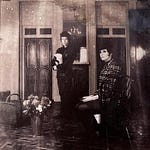
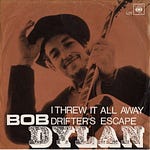
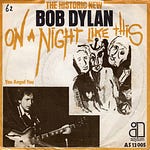

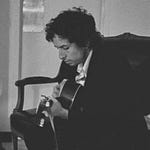
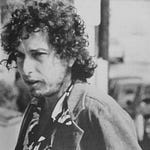

Share this post